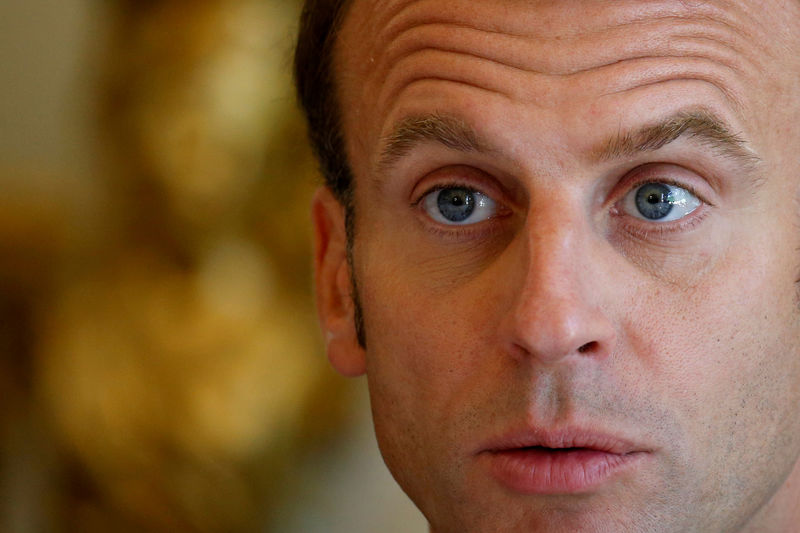By Leigh Thomas, Sarah White and Sudip Kar-Gupta
AIX-EN-PROVENCE, France (Reuters) - Assailed by social unrest and lagging in opinion polls, French President Emmanuel Macron has for now managed to cling on to a well of support from company leaders in France even as his reform push loses momentum.
Executives attending an annual economic conference in Aix-en-Provence were more than happy to cut Macron slack for the setbacks the 41-year-old's pro-business overhaul of the country has faced.
"Macron made some mistakes but he realised it and took measures to fix them," a senior French banker told Reuters at the conference bringing together France's corporate elite in the southern college town for a weekend of lofty debates about the state of the world.
"The situation isn't as bad as some think. He's done more in two years than other presidents did in five or 10 years," the banker added.
Two years into his presidency, Macron's reform agenda has taken a backseat after several months spent rebuilding political capital and trying to quell anti-government "yellow vest" protests.
That included a series of nationwide townhall debates and policy U-turns on issues like planned fuel tax hikes, as Macron also sought to repair his oft-cited image as an arrogant leader.
The former investment banker lost little time in his first months in office overhauling France's strict labour code to make it easier to hire and fire, as employers had long urged, and also brought in tax cuts for investors and companies to encourage job-creating investment.
But plans to reform unemployment insurance were only unveiled in June after months of delay, and a well-flagged pension overhaul now looks unlikely to happen before next year.
Both moves are expected to meet stiff resistance from unions, which could become a problem for Macron after he rode roughshod over worker representatives in his 2018 overhaul of indebted state-run rail company SNCF.
"If there has been a mistake, it's underestimating unions and employers federations," economist Jean-Herve Lorenzi, who organises the Aix conference, told Reuters. "The social partners need to be brought into the process."
But few in business circles question Macron's reform intentions.
"The unemployment insurance reform is making progress, proposals on retirement should come soon, there's no underlying change," Lorenzi added.
And with opponents on the right and left in disarray, at least in parliament there are still few chances of any hiccups.
"He's not going as fast as he could or should, but politically he's still got open freeway in front of him," a senior executive at one of France's biggest companies told Reuters.
KEEP IT UP
On the streets, a backlash over high living costs and perceived elitism has also simmered down.
"France is doing well, let's keep it up... I don't see any yellow vests," said Rodolphe Saade, chief executive of French shipping giant CMA CGM.
But the demonstrations, which descended into violent clashes last December including in Paris, have had a sobering effect for French companies too, when many are also grappling with other pressures like a U.S.-China trade war.
"We have to adapt (to that backdrop) without a hike in our costs, because neither our direct clients or auto consumers will accept a rise in prices, as we saw in France with the yellow vests", Jacques Aschenbroich, CEO of car parts supplier Valeo (PA:VLOF), told the conference on Sunday.
As a result of the protests, Macron shifted his policy focus from boosting business to supporting income for the poorest workers and pensioners, with a package of concessions last December worth more than 10 billion euros.
He followed up in April with a pledge to cut income tax by 5 billion euros next year. His poll ratings have begun creeping up from lows reached in the depths of the yellow vest crisis.
He has yet to detail, much less carry out, spending cuts that are supposed to finance tax cuts, much to the consternation of the central bank and the independent public audit office.
Also slipping on Macron's "to-do" list is the launch of France's biggest wave of privatisations in years, with the sale of airport operator ADP (NASDAQ:ADP) running into opposition as support builds for a referendum on the sell-off.

Instead, state lottery company FDJ will be the first test of the privatisation resolve, after France named banks to work on the process last week.